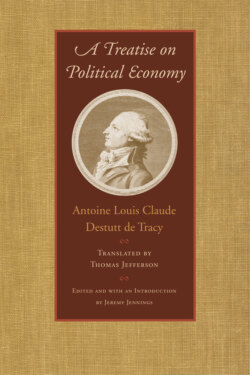Читать книгу A Treatise on Political Economy - Antoine Louis Claude Destutt De Tracy - Страница 16
На сайте Литреса книга снята с продажи.
Supplement
To the first section of the Elements of Ideology.
ОглавлениеI have previously reduced the whole science of logic to two facts.
The first is that our perceptions being every thing for us, we are perfectly, completely, and necessarily sure of whatever we actually feel.
The second is that consequently none of our judgments, separately taken, can be erroneous: inasmuch as we see one idea in another it is actually there; but their falsity, when it takes place, is purely relative to anterior judgments, which we permit to subsist; and it consists in this, that we believe the idea in which we perceive a new element to be the same as that we have always had under the same sign, when it is really different, since the new element which we actually see there is incompatible with some of those which we have previously seen; so that to avoid contradiction we must either take away the former or not admit the latter.
From these two facts or principles I deduce here fourteen aphorisms or maxims, which constitute in my opinion the whole art of logic, such as it proceeds from the true science of logic.
According to the last of these aphorisms, which enjoins us to abstain from judging while we have not sufficient data, I speak of the theory of probability.
The science of probability is not the same thing as the calculation of probability. It consists in the research of data and in their combination. The calculation consists only in the latter part: it may be very just, and yet lead to results very false. Of this the mathematicians have not been sufficiently aware. They have taken it for the whole science.
The science of probability is not then a particular science; as a research of data it makes a part of each of the sciences on which these data depend; as a calculation of data it is an employment of the science of quantity.
The science of probability is properly the conjectural part of each of the branches of our knowledge, in some of which calculation may be employed.
But it is necessary to see well what are those of which the ideas are, from their nature, susceptible of shades sufficiently precise and determinate to be referred to the exact divisions of the names of numbers and of cyphers, and in order that in the sequel we may apply to them the rigorous language of the science of quantities. To this again the mathematicians have not paid sufficient attention. They have believed that every thing consisted in calculation, and this has betrayed them into frightful errors.
In the state in which the science of probability is as yet, if it be one, I have thought I should confine myself to this small number of reflections, intended to determine well its nature, its means, and its object.
